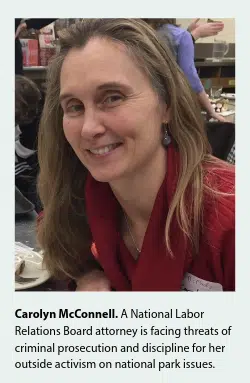This commentary was originally published in the Winter 2025 edition of PEEReview.
 PEER is engaged in precedent-setting work to secure the rights of federal employees to publish and be active in civic organizations on their own time. This work has renewed significance under a new Trump regime seeking to impose loyalty tests in federal service.
PEER is engaged in precedent-setting work to secure the rights of federal employees to publish and be active in civic organizations on their own time. This work has renewed significance under a new Trump regime seeking to impose loyalty tests in federal service.
Our client, Carolyn McConnell, has been a National Labor Relations Board (NLRB) field attorney since 2012. Before and throughout her tenure with the NLRB, she has been an active member of the North Cascades Conservation Council (NCCC), a more than 50-year organization dedicated to protecting Washington State’s Cascades – work that has nothing to do with the NLRB.
In February 2024, she drafted an opinion piece concerning the Park Service’s decision to eliminate ranger staff and close a visitor center in part of North Cascades National Park. She submitted it to her regional director and the NLRB Ethics Office for their review and informed them that NCCC was circulating a citizens’ petition urging the Park Service to restore ranger coverage.
The Ethics Office informed Ms. McConnell that she should not meet with National Park officials and that if she proceeded with the op-ed, she would do so “at her own risk.” After giving the Ethics Office several weeks to provide a clear yea or nay to the article, Ms. McConnell interpreted the Ethics Office advice as a caution and submitted it to the Seattle Times, which published it in March 2024 without referencing her NLRB employment. At that point:
- The Ethics Office filed a criminal referral against Ms. McConnell, asking the U.S. Attorney to prosecute her for violation of a penal code provision on conflicts of interest;
- After the U.S. Attorney declined prosecution, the Ethics Office asked the NLRB Office of Inspector General to investigate. In its Report of Investigation, the IG found “the subject engaged in misconduct by representing an organization before the National Park Service”; and
- The NLRB Regional Director issued her a “letter of counseling,” citing the IG report.
“Federal employees do not surrender their right to free speech, freedom of association, and the ability to petition the government on their own time if it does not conflict with their jobs,” declared PEER Executive Director Tim Whitehouse, an attorney formerly with EPA. “Federal employees have the right to be socially active and to comment on matters of concern, just like everybody else.”
The central issue concerns the interpretation of a federal criminal law that forbids a federal employee from acting as an “agent or attorney in any covered matter in which the United States is a party or has a direct and substantial interest.”
Twenty years ago, PEER won a court ruling saying this law could not be read so broadly as to infringe on federal employee free speech rights, but it looks like we may need to relitigate the issue. Ironically, this is taking place within the NLRB, an agency dedicated to protecting the rights of employees in the workplace.
 Colleen Teubner is a Litigation and Policy Attorney at PEER and a lover of backpacking, books, and board games.
Colleen Teubner is a Litigation and Policy Attorney at PEER and a lover of backpacking, books, and board games.